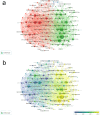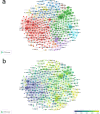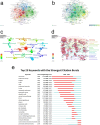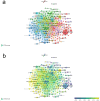Exploration of the current status and trends of pancreatic cancer immune cells in the past 30 years: a bibliometric analysis
- PMID: 40517216
- PMCID: PMC12167183
- DOI: 10.1007/s12672-025-02886-5
Exploration of the current status and trends of pancreatic cancer immune cells in the past 30 years: a bibliometric analysis
Abstract
Objective: Immune cells are pivotal in progressing and treating pancreatic cancer. Over the past three decades, the complex interactions between pancreatic cancer and immune cells have garnered much attention, as evidenced by the increasing number of publications in this domain. This bibliometric study maps the global research landscape of pancreatic cancer immune cell interactions, emphasizing evolving trends, collaborative networks, and therapeutic innovation.
Method: Using VOSviewer and CiteSpace, we analyzed 2658 articles from the Web of Science Core Collection (2000-2024) to evaluate publication trends, collaborative networks, keyword dynamics, and highly cited works.
Results: Annual publications surged from 4 (2000) to 453 (2024), with China (44.9%) and the U.S. (33.6%) dominating output. Key institutions included Fudan University (102 articles) and Zhejiang University (88 articles). Keyword evolution revealed three phases: antitumor mechanisms, clinical translation of checkpoint inhibitors, and recent emphasis on stromal-immune crosstalk. High-impact works by Brahmer (N Engl J Med 366:2455-2465, 2012) and Marabelle (J Clin Oncol 38:1-10, 2020) underscored immunotherapy milestones.
Conclusion: This bibliometric analysis highlights the dynamic nature of pancreatic cancer immune cell research, emphasizing the growing global interest and investment in this field. The findings underscore the need for ongoing monitoring of research trends to inform and propel innovative therapeutic strategies, ultimately improving patient outcomes.
Keywords: Bibliometric analysis; Citespace; Immune cells; Pancreatic cancer; VOSviewer.
© 2025. The Author(s).
Conflict of interest statement
Declarations. Ethics approval and consent to participate: Review and/or approval by an ethics committee as well as informed consent was not required for this study because this article only used existing data from published studies and did not involve any direct experimentation/studies on living beings. Consent for publication: All the authors have read and approved the final manuscript and agree with its submission to the Journal of Discover Oncology. Competing interests: The authors declare no competing interests.
Figures








Similar articles
-
Current perspectives and trends of CD39-CD73-eAdo/A2aR research in tumor microenvironment: a bibliometric analysis.Front Immunol. 2024 Aug 12;15:1427380. doi: 10.3389/fimmu.2024.1427380. eCollection 2024. Front Immunol. 2024. PMID: 39188712 Free PMC article.
-
Emerging research themes in ferroptosis research for non-small cell lung cancer: a bibliometric and visualized analysis.Front Immunol. 2025 May 16;16:1563108. doi: 10.3389/fimmu.2025.1563108. eCollection 2025. Front Immunol. 2025. PMID: 40453086 Free PMC article.
-
Current Status and Future Directions of Ferroptosis Research in Breast Cancer: Bibliometric Analysis.Interact J Med Res. 2025 Feb 26;14:e66286. doi: 10.2196/66286. Interact J Med Res. 2025. PMID: 40009842 Free PMC article.
-
Knowledge mapping and current trends of immunotherapy for prostate cancer: A bibliometric study.Front Immunol. 2022 Oct 27;13:1014981. doi: 10.3389/fimmu.2022.1014981. eCollection 2022. Front Immunol. 2022. PMID: 36389756 Free PMC article.
-
Bibliometric analysis of laryngeal cancer treatment literature (2003-2023).Heliyon. 2024 Dec 16;11(1):e40832. doi: 10.1016/j.heliyon.2024.e40832. eCollection 2025 Jan 15. Heliyon. 2024. PMID: 39811326 Free PMC article. Review.
References
Grants and funding
LinkOut - more resources
Full Text Sources
Miscellaneous
